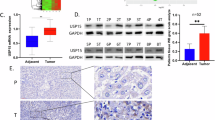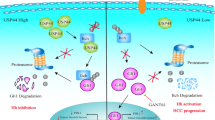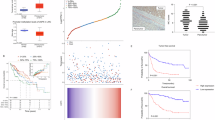Abstract
Although deubiquitinases (DUBs) have been well described in liver tumorigenesis, their potential roles and mechanisms have not been fully understood. In this study, we identified ubiquitin-specific protease 1 (USP1) as an oncogene with essential roles during hepatocellular carcinoma (HCC) progression. USP1, with elevated expression levels and clinical significance, was identified as a hub DUB for HCC in multiple bioinformatics datasets. Functionally, USP1 overexpression significantly enhanced the malignant behaviors in HCC cell lines and spheroids in vitro, as well as the zebrafish model and the xenograft model in vivo. In contrast, genetic ablation or pharmacological inhibition of USP1 dramatically impaired the phenotypes of HCC cells. Specifically, ectopic USP1 enhanced aggressive properties and metabolic reprogramming of HCC cells by modulating mitochondrial dynamics. Mechanistically, USP1 induced mitochondrial fission by enhancing phosphorylation of Drp1 at Ser616 via deubiquitination and stabilization of cyclin-dependent kinase 5 (CDK5), which could be degraded by the E3 ligase NEDD4L. The USP1/CDK5 modulatory axis was activated in HCC tissues, which was correlated with poor prognosis of HCC patients. Furthermore, Prasugrel was identified as a candidate USP1 inhibitor for targeting the phenotypes of HCC by an extensive computational study combined with experimental validations. Taken together, USP1 induced malignant phenotypes and metabolic reprogramming by modulating mitochondrial dynamics in a CDK5-mediated Drp1 phosphorylation manner, thereby deteriorating HCC progression.
Similar content being viewed by others
Log in or create a free account to read this content
Gain free access to this article, as well as selected content from this journal and more on nature.com
or
Data availability
All data generated or analyzed during this study are included in this published article. All of the data and material in this study are available when requested.
References
Huang DQ, Singal AG, Kanwal F, Lampertico P, Buti M, Sirlin CB, et al. Hepatocellular carcinoma surveillance — utilization, barriers and the impact of changing aetiology. Nat Rev Gastroenterol Hepatol. 2023;20:797–809.
Brown ZJ, Tsilimigras DI, Ruff SM, Mohseni A, Kamel IR, Cloyd JM, et al. Management of hepatocellular carcinoma: a review. JAMA Surg. 2023;158:410–20.
Yang C, Zhang H, Zhang L, Zhu AX, Bernards R, Qin W, et al. Evolving therapeutic landscape of advanced hepatocellular carcinoma. Nat Rev Gastroenterol Hepatol. 2023;20:203–22.
Dhanasekaran R, Suzuki H, Lemaitre L, Kubota N, Hoshida Y. Molecular and immune landscape of hepatocellular carcinoma to guide therapeutic decision making. Hepatology. 2023. https://doi.org/10.1097/HEP.0000000000000513.
Rimassa L, Finn RS, Sangro B. Combination immunotherapy for hepatocellular carcinoma. J Hepatol. 2023;79:506–15.
Singal AG, Kudo M, Bruix J. Breakthroughs in hepatocellular carcinoma therapies. Clin Gastroenterol Hepatol. 2023;21:2135–49.
Fang YZ, Jiang L, He Q, Cao J, Yang B. Deubiquitination complex platform: a plausible mechanism for regulating the substrate specificity of deubiquitinating enzymes. Acta Pharm Sin B. 2023;13:2955–62.
Park HB, Baek KH. E3 ligases and deubiquitinating enzymes regulating the MAPK signaling pathway in cancers. Biochim Biophys Acta Rev Cancer. 2022;1877:188736.
Lange SM, Armstrong LA, Kulathu Y. Deubiquitinases: from mechanisms to their inhibition by small molecules. Mol Cell. 2022;82:15–29.
Huang P, Wang Y, Zhang P, Li Q. Ubiquitin-specific peptidase 1: assessing its role in cancer therapy. Clin Exp Med. 2023;23:2953–66.
Zhang DY, Zhu Y, Wu Q, Ma S, Ma Y, Shen ZC, et al. USP1 promotes cholangiocarcinoma progression by deubiquitinating PARP1 to prevent its proteasomal degradation. Cell Death Dis. 2023;14:669.
Liu D, Li Q, Zang Y, Li X, Li Z, Zhang P, et al. USP1 modulates hepatocellular carcinoma progression via the Hippo/TAZ axis. Cell Death Dis. 2023;14:264.
Li JT, Li KY, Su Y, Shen Y, Lei MZ, Zhang F, et al. Diet high in branched-chain amino acid promotes PDAC development by USP1-mediated BCAT2 stabilization. Natl Sci Rev. 2022;9:nwab212.
Ma A, Tang M, Zhang L, Wang B, Yang Z, Liu Y, et al. USP1 inhibition destabilizes KPNA2 and suppresses breast cancer metastasis. Oncogene. 2019;38:2405–19.
Pao PC, Tsai LH. Three decades of Cdk5. J Biomed Sci. 2021;28:79.
Batra S, Jahan S, Ashraf A, Alharby B, Jawaid T, Islam A, et al. A review on cyclin-dependent kinase 5: An emerging drug target for neurodegenerative diseases. Int J Biol Macromol. 2023;230:123259.
Tang W, Lin C, Yu Q, Zhang D, Liu Y, Zhang L, et al. Novel medicinal chemistry strategies targeting CDK5 for drug discovery. J Med Chem. 2023;66:7140–61.
Pozo K, Bibb JA. The emerging role of Cdk5 in cancer. Trends Cancer. 2016;2:606–18.
Nikhil K, Shah K. CDK5: an oncogene or an anti-oncogene: location location location. Mol Cancer. 2023;22:186.
Zhu M, Wu M, Bian S, Song Q, Xiao M, Huang H, et al. DNA primase subunit 1 deteriorated progression of hepatocellular carcinoma by activating AKT/mTOR signaling and UBE2C-mediated P53 ubiquitination. Cell & bioscience. 2021;11:42.
Liu D, Li J, Rong X, Li J, Peng Y, Shen Q. Cdk5 promotes mitochondrial fission via Drp1 phosphorylation at S616 in chronic ethanol exposure-induced cognitive impairment. Mol Neurobiol. 2022;59:7075–94.
Wang F, Zhao W, Gao Y, Zhou J, Li H, Zhang G, et al. CDK5-mediated phosphorylation and stabilization of TPX2 promotes hepatocellular tumorigenesis. J Exp Clin Cancer Res. 2019;38:286.
Gao H, Yin J, Ji C, Yu X, Xue J, Guan X, et al. Targeting ubiquitin specific proteases (USPs) in cancer immunotherapy: from basic research to preclinical application. J Exp Clin Cancer Res. 2023;42:225.
Saha G, Roy S, Basu M, Ghosh MK. USP7 - a crucial regulator of cancer hallmarks. Biochim Biophys Acta Rev Cancer. 2023;1878:188903.
Bian S, Ni W, Zhu M, Zhang X, Qiang Y, Zhang J, et al. Flap endonuclease 1 facilitated hepatocellular carcinoma progression by enhancing USP7/MDM2-mediated P53 inactivation. Int J Biol Sci. 2022;18:1022–38.
Huang Q, Zhan L, Cao H, Li J, Lyu Y, Guo X, et al. Increased mitochondrial fission promotes autophagy and hepatocellular carcinoma cell survival through the ROS-modulated coordinated regulation of the NFKB and TP53 pathways. Autophagy. 2016;12:999–1014.
Yang YC, Lin YW, Lee WJ, Lai FR, Ho KH, Chu CY, et al. The RNA-binding protein KSRP aggravates malignant progression of clear cell renal cell carcinoma through transcriptional inhibition and post-transcriptional destabilization of the NEDD4L ubiquitin ligase. J Biomed Sci. 2023;30:68.
Liu S, Guo R, Xu H, Yang J, Luo H, Yeung SJ, et al. 14-3-3sigma-NEDD4L axis promotes ubiquitination and degradation of HIF-1alpha in colorectal cancer. Cell Rep. 2023;42:112870.
Antonenko S, Zavelevich M, Telegeev G. The role of USP1 deubiquitinase in the pathogenesis and therapy of cancer. Acta Biochim Pol. 2023;70:219–31.
Kim WT, Mun JY, Baek SW, Kim MH, Yang GE, Jeong MS, et al. Secretory SERPINE1 expression is increased by antiplatelet therapy, inducing MMP1 expression and increasing colon cancer metastasis. Int J Mol Sci. 2022;23:9596.
Schneider MA, Heeb L, Beffinger MM, Pantelyushin S, Linecker M, Roth L, et al. Attenuation of peripheral serotonin inhibits tumor growth and enhances immune checkpoint blockade therapy in murine tumor models. Sci Transl Med. 2021;13:eabc8188.
Funding
This study was supported by grants from National Natural Science Foundation (82070622, 82272839, 81702419), the Key Research and Development Plan of Jiangsu Province (BE2020668), Shanghai Natural Science Foundation (23ZR1445500), Jiangsu Health Innovation Team Program (CX2023001), Jiangsu Province Capability Improvement Project through Science, Technology and Education (ZDXK202234), Jiangsu Provincial Research Hospital (YJXYY202204), Nantong Health Commission Project (QN2022002).
Author information
Authors and Affiliations
Contributions
Wenjie Zheng, Hui Zhao, and Dong Liu designed and supervised this study. Saiyan Bian, Wenkai Ni, and Linlin Zhou drafted of the manuscript. Saiyan Bian, Yun Tong, Wei Liu, Chengchen Dai, Xuying Zhao, Yuwei Qiang, Jie Gao conducted the experiments. Yifu Xiao, Shengli Lin, and Suming Zhao collected clinical samples and performed the statistics. Jianing Gong performed the structure-based drug screening. Yinqi Chen and Zhaoyi Lin made grammar revision. All authors read and approved the final version of the manuscript.
Corresponding authors
Ethics declarations
Competing interests
The authors declare no competing interests.
Ethics approval
This study was approved by the ethical committee of Nantong University Affiliated Hospital and the Animal Care and Use Committee of Nantong University.
Additional information
Publisher’s note Springer Nature remains neutral with regard to jurisdictional claims in published maps and institutional affiliations.
Supplementary information
Rights and permissions
Springer Nature or its licensor (e.g. a society or other partner) holds exclusive rights to this article under a publishing agreement with the author(s) or other rightsholder(s); author self-archiving of the accepted manuscript version of this article is solely governed by the terms of such publishing agreement and applicable law.
About this article
Cite this article
Bian, S., Ni, W., Zhou, L. et al. Ubiquitin-specific protease 1 facilitates hepatocellular carcinoma progression by modulating mitochondrial fission and metabolic reprogramming via cyclin-dependent kinase 5 stabilization. Cell Death Differ 31, 1202–1218 (2024). https://doi.org/10.1038/s41418-024-01342-1
Received:
Revised:
Accepted:
Published:
Version of record:
Issue date:
DOI: https://doi.org/10.1038/s41418-024-01342-1
This article is cited by
-
NeuroD1-USP1-MYCN axis drives tumor progression in neuroblastoma
Journal of Translational Medicine (2026)
-
New perspectives in the treatment of liver cirrhosis: targeting macrophage regulatory mechanisms
Journal of Translational Medicine (2025)
-
Deubiquitinating enzymes in parkinson’s disease: molecular mechanisms and therapeutic potential
Molecular Medicine (2025)
-
The role of HECT-type E3 ubiquitin ligases in DNA damage response and repair
Cell Death Discovery (2025)
-
Dual roles of USP1 in HELLS deubiquitination and SUMOylation drive EMT and FOLFOX-based chemoresistance
Oncogenesis (2025)



